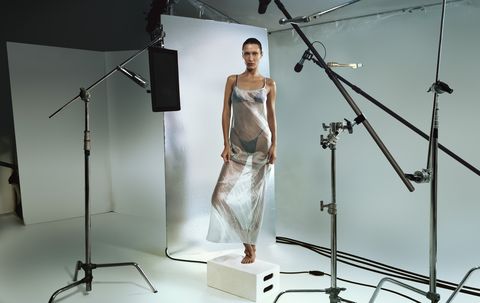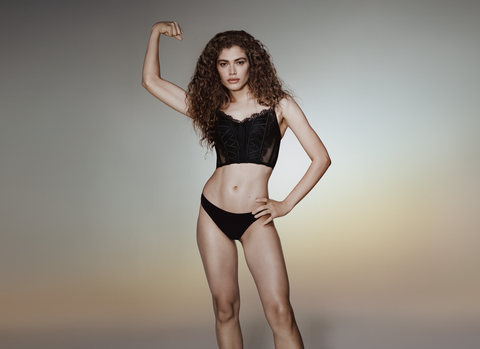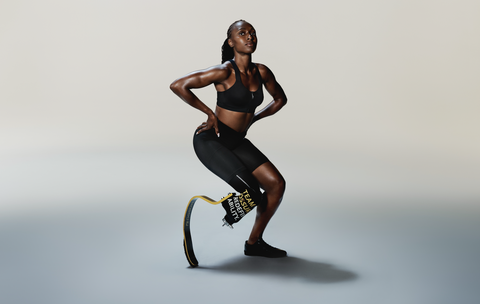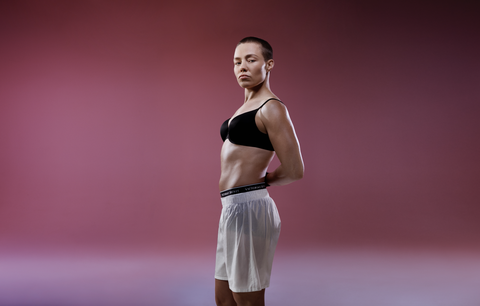One morning in August, just before sunrise, Bella Hadid arrived at a warehouse in Brooklyn. Blinking back at the bright light, she squinted a little, her skin bare and a tiny bit sunburned, her hair brooming out of a hastily tied low ponytail. She wore a Starface zit sticker on her left cheek. “I thought, yes, perfect, shoot her right now as she’s coming through the door,” says creative director Raul Martinez. “That’s it. That’s the shot.”
“The shot” turned out to be a major freeze frame in the new Victoria’s Secret campaign, Undefinable, which launches today. Photographed by Harley Weir and styled by Camilla Nickerson, it represents a marked change from the blonde barrel curls and all-pink-everything of previous VS eras, and serves as a visual manifesto for a brand caught in a tricky place: Reassuring its fans that VS is still a trusted source for affordably flirty lingerie, and convincing its detractors that it’s used a public reckoning as a catapult for social good. “For me, the most notable difference is Victoria’s Secret’s dedication to empowering women as the foundation for everything they do,” Hadid emailed from Paris. “A lot has changed.”
In the campaign, that change is represented by supermodels Hadid and Hailey Bieber, plus notable forces of nature like MMA fighter Rose Namajunas, 80-year-old fashion justice activist Bethann Hardison, Paralympic medalist Femita Ayanbeku, and country singer Brittney Spencer. In the campaign video, 30-year-old model Paloma Elsesser says, “I don’t know about you, but I feel like I’ve been sucking my stomach for my entire life” and Bieber shares, “we start forget that people are people” while slides proclaim “Nothing can define us. Not your standards. Not your stereotypes. Not your fantasies. Not anymore.” It’s a powerful rebuke of Victoria’s Secret’s previous M.O., which celebrated a certain type of beautiful girl—young, bouncy, delighted by the appeal of her (slim, taut, bare) body, and unbothered by Adam Levine’s front row catcalls—while deliberately shutting others out of their space. With Undefinable, VS wants to make it clear: That stops now.
For those just tuning in, here’s what’s up: After turning models like Heidi Klum and Tyra Banks into household names through its scanty fashion shows, Victoria’s Secret was famously “cancelled” in 2018 after CEO Ed Razek said some pretty questionable and hurtful stuff and was named in credible harassment claims by former models and staff. Sales dipped—not that much, but enough—and labels like Savage X Fenty and Parade took over with younger shoppers who wanted to see all bodies (especially their bodies) embraced before spending their money. Social media scorn and a scalding, scolding Hulu documentary followed.
So did a rapid transformation of Victoria’s Secret’s leadership and purpose. (It’s now “to become the world’s leading advocate for women and create positive change through the power of our products and our platform.”) The brand invested capital into female-led cancer research and woman-owned businesses. It pledged 100 percent pay equity for employees of all genders, and joined the 15 Percent Pledge to better support Black excellence and inclusion. With Undefinable, Victoria’s Secret seeks to reposition itself as both conscious and cool. If the old Victoria’s Secret was a homecoming queen, this new version is the girl who shows up at prom in vintage cowboy boots and a minidress. She’s more Maya Hawke than Miranda Kerr, which is to say, she’s got more quirk and introspection, but everyone still wants to be her.
“We wanted to really solidify and cement once and for all, we’ve changed,” says Martinez, who was a creative director for magazines—including, at one point, ELLE—before starting with VS last year. “We wanted to say, ‘This is our true self.’ It’s not just about the women that we photograph; it’s their voices. Who are they? What do they love? What is it that makes them who they are?” Hadid describes the shoot as “such a fun and comfortable environment,” while Martinez adds “I love that on set, they were loved, and our job was to make them feel comfortable and really appreciated. But,” he laughs, “sometimes, it was chaos!” At one point, Olympic champ Eileen Gu was doing flips on a trampoline, despite the concern of the photo crew. “We were worried it was too hot, but she was just going for it. Every shot was amazing, but she kept running back to the monitor to see how she was jumping. She was like, ‘No, I can get more height; I can do better.’ She was fearless and having so much fun, and making a competition with herself, not anyone else, you know? These women are amazing.”
They are also, it must be said, beautiful. Some have the sinewy build of relentlessly tough athletes; others have wider curves. Hardison has cropped grey hair, Ayanbeku is visibly disabled. All live on a real-world spectrum of skin tones and hair textures. But while it is still, infuriatingly, a rarity to see Elsesser’s softer stomach in a fashion campaign, she is undeniably, uncommonly divine. The same goes for Victoria’s Secret Collective members Megan Rapinoe and Priyanka Chopra, and the face of its Bombshell fragrance, Camila Cabello. All are fierce role models; all are dedicated and diverse talents; all are hot as hell.
Which brings us to the crux of the conflict: Lingerie is an exoskeleton of cultural desire that often reshapes the bare body to transform its appeal. Can a brand that sells it be, in VS’s own words, “representing and welcoming all women and their experiences,” even those women who have never felt—or who don’t want to feel—wanted by others? There is no easy answer to this, just like there is no concise way to define “beauty” or “hotness” in the first place. When Victoria’s Secret chose the word “undefinable,” it really meant it. But, as any woman can attest, you know desirability when you see it…and if you don’t see it, the status-conscious around you will aggressively point it out.
That’s precisely why it’s tough to see Victoria’s Secret go so hard on inclusion and empowerment while spotlighting women who are pretty damn exclusive themselves. Like Eileen Gu doing trampoline flips during a heatwave, it feels like a dazzling display of work to use goddesses as a yardstick for reality, when really, they’re holograms of our most treasured selves. That’s okay! Without symbols of super-womanhood, we wouldn’t have a pathway to our goals. But it would be a relief if we could admit that these women are avatars, not associates, more openly. It would be a revolution if VS did.
What’s cool is, it absolutely might. Currently, Victoria’s Secret is investing in women-led businesses like Frankie’s Bikinis and giving $10 million annually to cause-based philanthropy. The company’s board is 86 percent female and 46 percent people of color, and its pay equity pledge denotes a major shift for a mass retailer. VS currently offers 66 bra sizes, and options for maternity and mastectomy bras that cost the same or less than its standard ones. And it has more in the pipeline, with Martinez saying the Undefinable campaign isn’t just a revamp, but “a prequel of something yet to come.”
For now, let’s take a second to applaud the new Victoria’s Secret era and its reverse namaste—something like “the imperfection in you recognizes the imperfection in me”—while conceding that VS continues to be so hypnotically pretty, it’s almost impossible to ask if inclusive empowerment and stylized beauty can exist in the same space. Almost.
“Her beauty and her brain go not together.” —William Shakespeare



